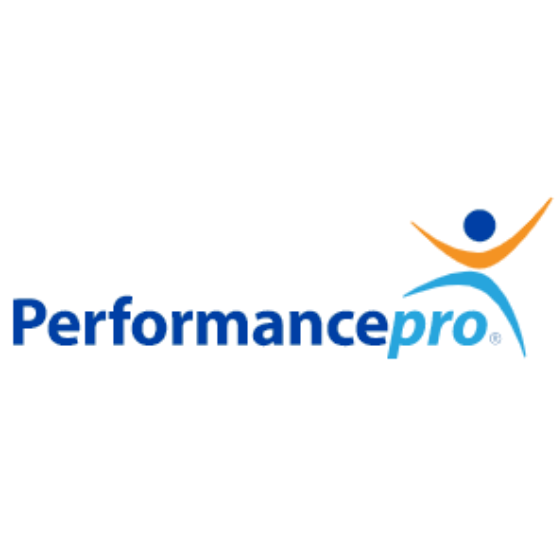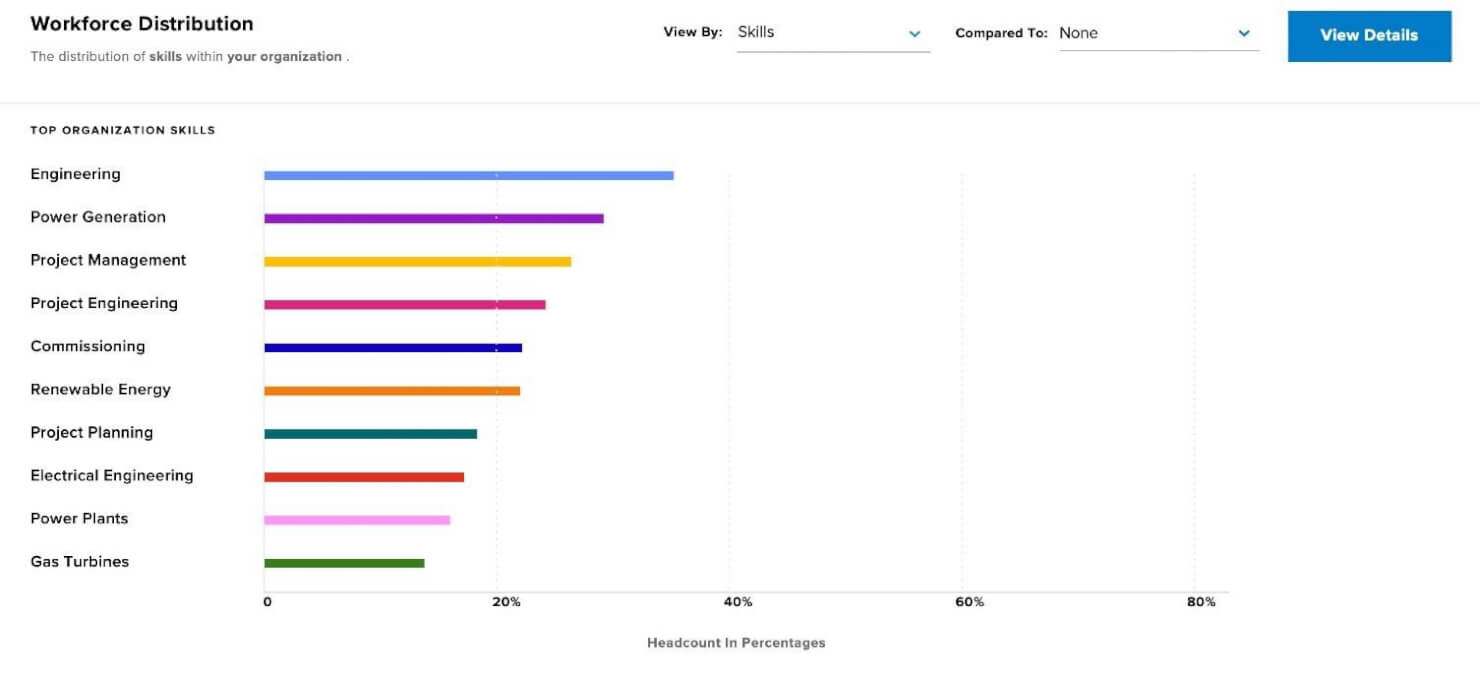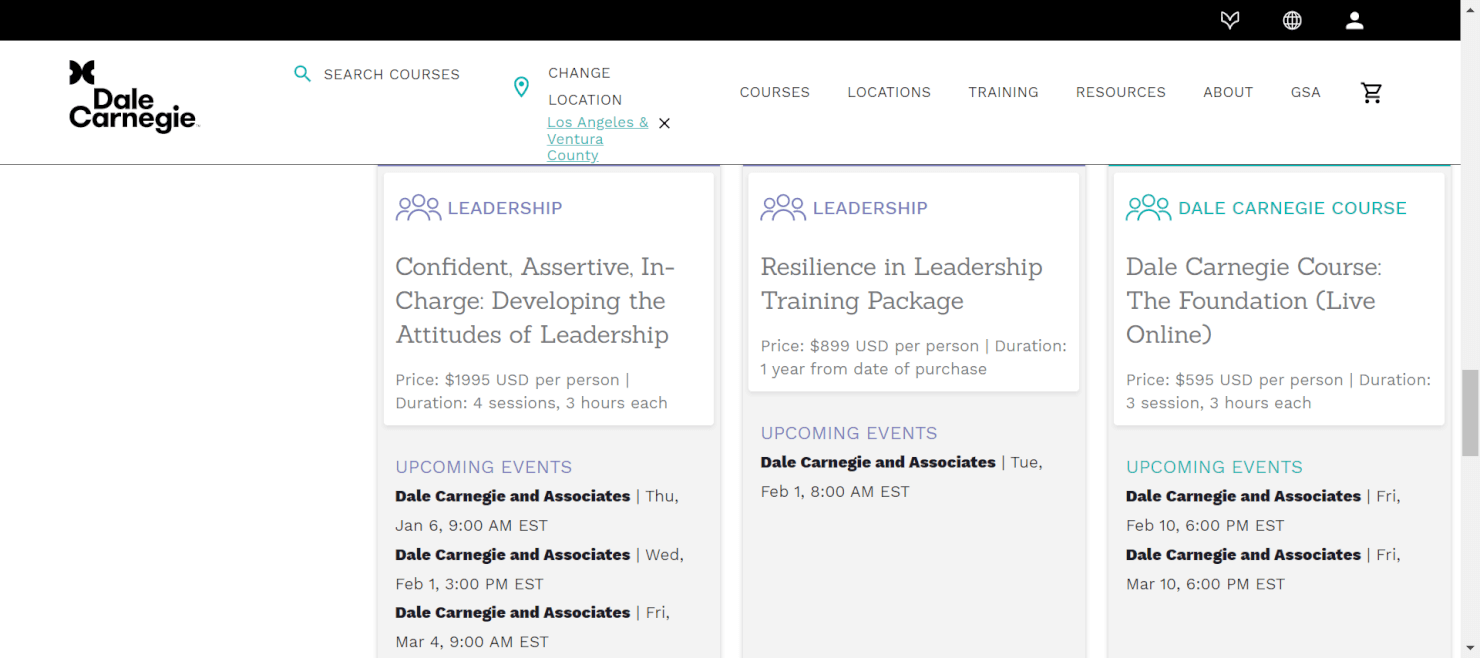10 Best Leadership Development Programs List
Here’s my shortlist of the best leadership development programs and platforms for build-your-own or ready-made leadership-oriented online courses:
The best leadership development programs help you cultivate high-impact leaders through structured training, feedback loops, and mentorship—so your organization can thrive with a confident, capable leadership pipeline.
When leadership roles are assumed rather than developed, teams can suffer from misaligned communication, inconsistent decision-making, and stunted growth. The right program combines assessments, personalized learning paths, and real-world application to nurture the required strategic thinking, emotional intelligence, and team management skills.
With tools like 360° feedback, executive coaching, virtual learning modules, and peer collaboration, these programs foster continuous growth and measurable leadership impact.
After reviewing dozens of development tracks—from emerging leader academies to executive accelerators—I’ve curated top solutions that are engaging, scalable, and rooted in real-world outcomes.
Why Trust Our Reviews
We've been testing and reviewing HR software and services since 2019. During that time, we've tested more than 2,000 tools and 200 service providers for different HR use cases and written over 1,000 comprehensive software reviews.
As HR professionals ourselves, we know how critical and difficult it is to make the right decision when selecting a new HR service provider to work with.We invest in deep research to help our audience make better purchasing decisions. Learn how we stay transparent, and take a look at our review methodology.
Best Leadership Development Programs: Comparison Chart
This comparison chart summarizes basic details about each of my top leadership development program selections. You can view pricing details and the availability of free trials or demos side-by-side to help you find the best development courses for your budget and business needs.
| Tool | Best For | Trial Info | Price | ||
|---|---|---|---|---|---|
| 1 | Best for aligning performance with growth | Free demo available | From $2 to $7/employee/month | Website | |
| 2 | Best for tailored mentoring programs | Free demo available | From $10,000/year | Website | |
| 3 | Best for an on-demand leadership training library | Free one-month trial | From $26.99/user/month | Website | |
| 4 | Best for leadership development using Microsoft Teams | Not available | Pricing upon request | Website | |
| 5 | Best for measuring and benchmarking leadership skills | Not available | Pricing upon request | Website | |
| 6 | Best for a mobile-first leadership solution | Not available | Pricing upon request | Website | |
| 7 | Best for coaching and micro-learning | Free demo available | Pricing upon request | Website | |
| 8 | Best for executive education and teaching the skills of the future | Not available | Pricing varies per course | Website | |
| 9 | Best for a century of leadership training | Not available | Pricing upon request | Website | |
| 10 | Best for proven leadership development principles | Not available | Pricing upon request | Website |
-

Rippling
Visit WebsiteThis is an aggregated rating for this tool including ratings from Crozdesk users and ratings from other sites.4.8 -

Paylocity
Visit WebsiteThis is an aggregated rating for this tool including ratings from Crozdesk users and ratings from other sites.4.5 -

Willo
Visit WebsiteThis is an aggregated rating for this tool including ratings from Crozdesk users and ratings from other sites.4.8
Best Leadership Development Program Reviews
Here’s a brief description of each online leadership development platform to showcase each option’s best use case, some noteworthy features, and screenshots to give you a snapshot of their user interface.
Performance Pro helps you create development plans, track leadership potential, and align individual performance with organizational objectives. You can use it to set SMART goals, run new hire assessments, and map out succession plans so you know who’s ready to step into leadership roles. The built-in analytics let you see how your team is progressing and where extra support may be needed.
You’ll also have tools to connect performance results directly to compensation, so leadership development is rewarded in a tangible way. This link between recognition and growth helps encourage your future leaders to stay engaged and keep building their skills.
Together Software is a platform designed to enhance leadership development through structured mentoring programs. It connects employees with experienced mentors, facilitating skill development and professional growth.
One standout feature of Together is its customizable matching algorithm. This tool pairs mentors and mentees based on specific criteria such as skills, goals, and interests, ensuring meaningful and productive relationships. By aligning participants effectively, the platform fosters tailored development, enabling emerging leaders to gain insights from seasoned professionals.
Together also allows you to coordinate various learning activities, including in-person, one-on-one, group, peer, and coffee chats. Automated reminders and centralized resources keep participants engaged and on track, making it easier to deliver impactful leadership training programs.
Integrations are available with BambooHR, Google Workspace, Oracle PeopleSoft, Microsoft Teams, Workday HCM, and Zoom.
LinkedIn Learning provides on-demand video training on a wide range of business, creative, and technology topics. Users benefit from a learning experience with personalized course and module recommendations, designed to help them achieve their full potential. These are based on data-driven insights from the millions of professionals who use the LinkedIn network.
With over 13,000 high-quality courses in its library, LinkedIn Learning offers a wealth of leadership development training. The on-demand system means learners can watch courses and webinars whenever convenient, using desktop or mobile devices. All courses are taught by experts with real-world experience.
LinkedIn Learning costs from $26.99/user/month, and a free one-month trial is available.
Grow360 offers leadership development solutions to help executives achieve higher performance and improve retention. The company's 7A methodology is designed to improve team dynamics and employee engagement. Team members are empowered to create self-awareness and define development objectives.
Grow360 integrates with Microsoft Teams to access all services directly within the Teams environment. Each team member is allocated a 'My Grow Space' in Teams. This allows employees to work on improving their leadership skills within their everyday business environment.
Grow360 offers customized pricing on request.
Korn Ferry aims to close the 'potential gap' between where organizations are now and where they want to be in the future. This is achieved using the Intelligence Cloud, which uses AI to identify areas where improvements are needed. Internal talent data and external information feed a suite of enterprise applications to find the right answers.
Using Korn Ferry, companies can benchmark performance at industry, organization, team, and individual levels. These insights can then be used to align talent with strategy and make more informed decisions.
Korn Ferry offers customized pricing on request. There is no free trial.
BetterUp is focused on providing executive coaching to help employees acquire new skills. Team members take an assessment on their mobile devices. The software then recommends three coaches based on AI-driven technology.
The employee can check out the background and qualifications of each coach, selecting the one that feels right for the job. Coaching sessions are held through the BetterUp app, using a video connection. The aim is to produce senior leaders who take team and business performance to the next level.
BetterUp offers customized pricing on request. There is no free trial.
LEADx designed their learning & development platform to solve two common challenges: people are too busy to take training courses, and even when they do, they often don’t remember or apply their learnings. To tackle these challenges, LEADx designed a program for executives that includes 200+ micro-learning lessons specifically developed for learners with busy schedules and short attention spans.
Their courses are mobile-accessible, which helps busy executives complete micro-tasks and micro-actions from anywhere. Tasks are typically 10 to 15 minutes long, making them easier to fit into your day, with automated nudges and reminders to keep learning on track. All learners also gain access to their certified leadership coaching team (that operates under the name “Coach Amanda”) allowing them to ask questions about anything, at any time.
LEADx offers customized pricing upon request, as well as a free demo.
Emeritus is committed to teaching the skills of the future by making high-quality education accessible and affordable to individuals, companies, and governments around the world. It does this by collaborating with more than 50 top-tier universities across the United States, Europe, Latin America, Southeast Asia, India and China.
Emeritus’ short courses, degree programs, professional certificates, and senior executive programs help individuals learn new skills and transform their lives, companies and organizations. Its unique model of state-of-the-art technology, curriculum innovation, and hands-on instruction from senior faculty, mentors and coaches has educated more than 250,000 individuals across 80 countries.
Founded in 2015, Emeritus, part of the Eruditus Group, has more than 2300+ team members globally and offices in Mumbai, New Delhi, Shanghai, Singapore, Palo Alto, Mexico City, New York, Boston, London, and Dubai.
Visit Emeritus' website for pricing details on their individual courses.
DaleCarnegie.com is the legacy of the eponymous trainer—author of the bestselling personal development book, ‘How to Win Friends and Influence People.’ Today, the organization provides executive leadership training online as well as in-person. Countless great leaders have benefited from the world-class business education on offer.
Through DaleCarnegie.com, your team members can improve competencies by learning from leadership and change management principles proven over many decades. Although rooted in traditional training, the courses offered today are designed to match the needs of high-potential executives who want to become effective leaders.
Courses are priced individually, with details available on the website. There are no free trials.
Franklin Covey delivers leadership, individual effectiveness, and business execution training. The education is fundamentally based on the writings of Benjamin Franklin and Steven Covey. The business has grown to offer a wide range of leadership training programs.
The training portfolio includes management training based on 'The 7 Habits of Highly Effective People,' plus courses on the essential leadership roles and a wealth of leadership and development training. Senior executives can use these to develop a forward-thinking leadership style and become better time managers.
Korn Ferry offers customized pricing on request. There is no free trial.
Other Professional Development Programs
Here are several other leadership development courses that looked interesting, but didn’t quite make it into my top 10 shortlist:
- Hone
For high-impact, live leadership courses
- LifeLabsLearning.com
For lab-based, research-driven insights
- Torch.io
For combining people and technology to deliver digital learning
- Deel
For leader development with career progression frameworks
- Qooper
For executing high potential leadership programs through mentoring, learning and inclusion
- Paycor
For comprehensive leadership training and development programs
- Synergy Learning
For interactive leadership training
- Inspire
For an integrated suite of talent apps
- CCL
For a human-centered approach to leadership development
Related HR Software Reviews
If you're looking for better HR tools in addition to services, check out these other core HR offerings, that we've tested and evaluated:
- HR Software
- Payroll Software
- Recruiting Software
- Employer of Record Services
- Applicant Tracking Systems
- Workforce Management Software
Selection Criteria for Leadership Development Programs
Leadership development programs cover a range of services designed to enhance various aspects of leadership, from strategic thinking to emotional intelligence. My approach to choosing the best programs for this list is grounded in thorough research coupled with my understanding of the needs and objectives of those seeking to elevate their leadership capabilities.
Here's a summary of the criteria I used to make my final selections for this list:
Core Leadership Development Program Capabilities (25% of total score): To be considered for inclusion in this list, each program had to fulfill these common needs first:
- Develop skills to enhance strategic decision-making abilities
- Improve team leadership and management skills
- Develop high emotional intelligence for better interpersonal relationships
- Foster innovative thinking and problem-solving capabilities
- Help build a strong personal leadership brand and presence
Additional Standout Services (25% of total score): To help me select the best leadership programs out of the numerous options available, I also took note of any less common capabilities, including:
- Advanced digital platforms offering AI-driven personalized learning experiences
- Unique mentorship programs that pair emerging leaders with veterans in their specific industry
- Specialized workshops focused on leading in a digital transformation era
- Exclusive networking events with thought leaders and innovators across various sectors
- Innovative feedback tools utilizing AI for real-time, personalized development insights
Industry Experience (10% of total score): To evaluate the industry experience of each management program, I considered the following:
- A history of successful leadership development engagements, with a preference for those in operation for over a decade
- Credentials of staff, including advanced degrees in organizational psychology, leadership coaching certifications, and a track record of published research in the field
Onboarding (10% of total score): To get a sense of each provider's onboarding process, I considered the following factors:
- Availability of comprehensive onboarding materials, such as training videos and detailed guides
- Hands-on service tours to familiarize new clients with all features and services
- Access to webinars and live sessions to ensure smooth integration into the program
- A dedicated account manager or contact person for immediate assistance
Customer Support (10% of total score): To evaluate the level of customer support each training provider offered, I considered the following:
- 24/7 access to customer support through various channels, including live chat, email, and phone
- Dedicated account managers for personalized support throughout the program duration
- Responsive technical support for issues related to the digital learning platform
Value for Price (10% of total score): To gauge the overall value of program, I considered the following factors:
- Transparent pricing models or costs per course
- Flexible pricing options to accommodate different budgets, including subscription-based models or a pay-per-course model
- Evidence of tangible ROI from past participants, such as improved leadership effectiveness and team performance metrics
Customer Reviews (10% of final score): Evaluating customer reviews is the final element of my selection process, which helps me understand how happy real users are with a service. Here are the factors I considered:
- Positive feedback related to program content quality, mentorship effectiveness, and the impact courses had on leadership development
- Testimonials from former participants highlighting specific skillsets and qualities they developed through the program
- Positive comments on the ease of use of digital platforms and the applicability of learned skills in real-world scenarios
Using this assessment framework helped me identify the leadership development programs that go beyond basic requirements to offer additional value through unique services, deep industry experience, smooth onboarding, effective support, and overall value for price.
How to Choose a Leadership Development Program
To help you figure out which leadership development program best fits your needs, the first step is to document your specific needs and challenges.
| Factor | What to Consider |
|---|---|
| Target Audience | Is the program designed for emerging leaders, mid-level managers, or senior executives? Choose one that aligns with your team's experience and leadership stage. |
| Delivery Format | Do you need in-person workshops, virtual modules, or a blended approach? Consider your team’s location, availability, and preferred learning style. |
| Program Length & Flexibility | How long does the program run, and is it self-paced or scheduled? Opt for a timeline that balances depth with your team's workload. |
| Curriculum Focus | Does it cover strategic thinking, people management, emotional intelligence, or innovation? Prioritize the leadership competencies most relevant to your goals. |
| Customization | Can the program be tailored to your industry, company values, or organizational structure? Custom content increases relevance and impact. |
| Assessment & Feedback Tools | Are 360° assessments, personality tools, or progress tracking included? These help measure growth and identify blind spots. |
| Mentorship & Coaching | Does the program offer access to coaches, mentors, or peer learning groups? This added support deepens learning and accountability. |
| Scalability | Can the program grow with your organization or be rolled out to multiple cohorts? Consider scalability if you plan to develop leadership at different levels. |
| ROI & Business Impact | Does the provider share case studies or data on improved retention, engagement, or performance? Look for measurable outcomes to justify the investment. |
| Cost & Budget Alignment | Is the pricing per participant, per cohort, or enterprise-wide? Make sure it aligns with your learning and development budget and expected outcomes. |
Trends in Leadership Development Programs for 2025
As leadership development programs continue to evolve, the technology used to host these programs have evolved in tandem, incorporating modern elements such as artificial intelligence (AI), machine learning (ML), virtual reality (VR), and augmented reality (AR).
These technological advancements are coupled with a shift in the skills and qualities that are required to be an effective leader in today's dynamic work environment.
Here are several trends that are impacting the design and implementation of leadership development programs as of 2025:
- Integration of AI and ML: AI and ML technologies are increasingly being integrated into leadership development programs to personalize learning experiences and provide data-driven insights into leadership styles and effectiveness. This trend reflects the growing demand for customized learning paths that adapt to individual leaders' strengths and areas for improvement.
- VR and AR for Immersive Learning: The use of VR and AR technologies for creating immersive learning experiences is on the rise. These tools offer realistic simulations and scenarios, allowing leaders to practice their skills in a safe, controlled environment. This innovative approach caters to the need for practical, hands-on experience in leadership training.
- Microlearning Platforms: The adoption of microlearning platforms that offer short, focused learning sessions is growing. This trend caters to busy professionals seeking to develop leadership skills without committing to long-duration courses, addressing the challenge of fitting leadership development into hectic schedules.
- Focus on Soft Skills and Emotional Intelligence: There's a noticeable shift towards emphasizing soft skills and emotional intelligence in leadership development. Many programs have incorporated modules on empathy, communication, and emotional regulation to help leaders navigate complex interpersonal dynamics and foster more inclusive work environments.
- Sustainability and Ethical Leadership: Programs focusing on sustainability and ethical leadership principles are gaining traction. This reflects the increasing importance of corporate social responsibility and the demand for leaders who can drive sustainable business practices.
As you continue your search for the best leadership program for your needs, keep an eye out for these trends.
What are Leadership Development Programs?
Leadership development programs are structured learning experiences designed to build and strengthen leadership skills at various levels within an organization. They typically include training on communication, decision-making, emotional intelligence, strategic thinking, and team management.
These programs may involve workshops, coaching, mentorship, assessments, and real-world projects to help participants apply what they learn. Their goal is to prepare individuals to take on greater responsibilities and lead teams more effectively, supporting long-term business growth and organizational health.
Features of Leadership Development Programs
Although every leadership development platform is different, here are some services, features, and capabilities that leadership training courses typically cover:
- Digital Learning Platforms: These platforms offer the convenience of learning at one's own pace, enabling leaders to integrate development activities into their busy schedules.
- Customized Learning Paths: Customized learning paths ensure that leaders receive the specific training they need to fill their unique skill gaps, while also achieving organizational goals. This makes the development process more efficient and effective in addressing individual and organizational gaps.
- Leadership Simulations: These are scenario-based learning experiences that mimic real-world challenges. Simulations offer a safe space to experiment with different strategies and learn from mistakes without real-world consequences.
- Interactive Workshops: These are hands-on sessions that encourage active participation and collaboration. These workshops facilitate peer learning and help leaders develop practical skills in a supportive, engaging environment.
- Mentorship and Coaching: Mentorship and coaching provide personalized feedback and actionable insights, allowing emerging leaders to refine their leadership style and approach based on real-world wisdom. (If mentoring is your main area of interest, take a look at our list of the best mentoring software as well.)
- Leadership Assessments: This refers to tools and evaluations to identify strengths and areas for improvement. By clearly understanding their starting point, leaders can track their progress and make informed decisions about their development journey.
- Strategic Thinking Training: Many leadership programs are heavily focused on developing foresight, innovation, and strategic planning skills. Strategic thinking training helps leaders navigate complex business landscapes and drive their organizations forward with vision and purpose.
- Emotional Intelligence Development: This refers to sessions aimed at improving self-awareness, empathy, and relationship management. Emotional intelligence is key to leading with compassion, understanding team dynamics, and motivating others effectively.
- Networking Opportunities: Networking is crucial for developing potential leaders. It creates opportunities for peers to share best practices, form strategic alliances, and gain new perspectives on challenges faced in leadership communities.
- Feedback Mechanisms: Most systems offer tools to collect ongoing feedback and measure program effectiveness. Continuous feedback ensures that leaders are aware of their progress and can adjust their learning path as needed.
Benefits of Leadership Development Programs
Leadership development programs are designed to help organizations prepare their existing staff for potential leadership positions in the future. These programs not only benefit the participants themselves but also significantly impact the overall performance of the organization.
Here are several benefits you can expect to gain by signing up for the best leadership development program to help your staff reach their full potential:
- Enhanced Leadership Skills: Participants learn to make better decisions, communicate more effectively, and manage teams more efficiently, leading to improved team performance and goal achievement.
- Increased Employee Engagement: Leaders who undergo development programs are better equipped to inspire their teams, foster a positive work environment, and effectively address any engagement issues, resulting in higher employee satisfaction and retention rates.
- Improved Succession Planning: Leadership development programs prepare high-potential employees for senior roles, ensuring the organization has a continuous supply of skilled leaders ready to fill critical positions as they become available.
- Enhanced Organizational Culture: Through leadership development, leaders learn to embody and promote the company's values and vision, leading to a more engaged and unified workforce that shares common goals and values.
- Better Adaptability to Change: Leaders equipped with the skills and knowledge from these programs can better navigate the challenges of a rapidly changing business environment, ensuring the organization remains competitive and can capitalize on new opportunities.
Costs & Pricing for Leadership Development Programs
Leadership development programs vary widely in their approach to pricing, reflecting the diversity of formats, content, and delivery methods available in the market. The structure of the pricing models often depends on the type of program, its duration, the level of customization, and the mode of delivery (e.g., in-person, online, or hybrid).
Here are some common pricing structures you might encounter:
- Per-Course Fee: This payment structure is common with modular programs or those offering a series of distinct courses. This approach allows individuals and organizations to sign up for training that fulfills specific needs and budgets.
- Per-Participant Fee: Many programs charge a fee based on the number of individuals participating. This model is common in open enrollment programs where individuals from different organizations attend. The fee can vary depending on the program's reputation, duration, and the included resources.
- Flat Rate for Group Programs: For organizations looking to train a cohort of leaders or managers, leadership development providers may offer a flat rate for the group. This cost-effective model supports more program customizations to fit an organization's specific needs.
- Subscription-Based Models: Some leadership development programs, especially those offered online, operate on a subscription basis, granting access to a range of courses and resources for a monthly or annual fee. This model provides flexibility and ongoing development opportunities for participants.
- Tiered Pricing Models: Some programs offer tiered pricing based on the level of access, support, or customization desired. For instance, a basic package might include access to online materials and webinars, while premium tiers could offer personalized coaching, assessments, and in-person retreats.
- Customized Pricing: For highly customized leadership development initiatives designed for a particular organization, providers often create a tailored pricing model. This model considers the scope of the program, the level of personalization, the number of participants, and any specific outcomes the organization aims to achieve.
When considering a leadership development program, it's crucial for organizations to carefully review the pricing structure, understand what is included in the cost, and assess the program's potential return on investment.
Frequently Asked Questions
If you’re looking for more information about leadership development programs, check out these answers to common questions.
How do you measure the ROI of a leadership development program?
Measuring the ROI of a leadership development program involves a blend of qualitative and quantitative methods. Start by setting clear objectives aligned with your business goals, like improving team performance or increasing employee engagement. Then, you can use pre-and post-program assessments to measure skills improvements and behavioral changes. Track key performance indicators (KPIs) such as:
- Retention rates
- Promotion rates within program participants
- And any direct impact on revenue or cost savings
You can also gather feedback from participants and their direct reports to assess changes in leadership effectiveness. Combining these data points will provide a comprehensive view of the program’s impact and its ROI.We’ve tested more than 2,000 tools and 200 service providers for different HR use cases and written over 1,000 comprehensive software reviews.
How long do leadership development programs typically last?
Programs can range from short-term workshops (a few days or weeks) to long-term academies or cohorts that span several months. The best duration depends on your goals, availability, and how deep the training needs to go.
Are shorter or longer programs more effective?
It depends on your goals. Short programs (1–3 days) are great for focused skill-building, while longer programs (3–12 months) allow for deeper development, spaced learning, and habit formation. Look for programs that match the depth of development you’re seeking.
More Resources for Emerging Leaders
If you found this list helpful, you may also want to check out our articles on resonant leadership and leading with empathy.
We also have numerous other resources to help you with leadership coaching. Here are a few of my favorites:
- Leadership Development Programs: What Are They And Why Do You Need One?
- The Secret Code To Exceptional Leadership (with Ian Mills from Transform Performance International)
- Four Leadership Lessons From The Early Days Of Abebooks
- Learning Management Systems (LMS) for Small Businesses
Subscribe To The People Managing People Newslettter
To keep updated on all the latest programs and tools subscribe to our newsletter for HR and business leaders. You'll receive all our latest content to help you grow in your career and make greater impact in your org.
























